On March 16, 1891, Lynden incorporates as a town of the fourth class. Located in northwestern Whatcom County, Lynden, only five miles south of the Canadian border, will grow into a pleasant, conservative community with a rich history.
Making it Official
The Nooksack Indians had long inhabited the land along the Nooksack River in northwestern Whatcom County before the first Euro-American settlers began edging into the area in the 1860s. A few more settlers arrived in the 1870s, and the nascent community was named Lynden. Real growth arrived in the early to mid-1880s and turned Lynden into a cohesive community.
By the beginning of 1891 Lynden had (according to its incorporation petition) an estimated population of 650, and the residents decided to make it official. The January 15, 1891, issue of the Lynden Pioneer Press announced the names of 62 men who had signed a petition to the Whatcom County Board of Commissioners asking to incorporate as the Town of Lynden. The petition was duly presented to the board, which met on February 13 and set a special election for March 6, 1891.
Voting took place in the Judson Opera House (the town's informal community center), located on the northwest corner of 5th and Front streets. It was a blowout, with 95 in favor of incorporation and only 10 against. Holden Judson (1826-1899) was unanimously elected mayor, with 107 votes -- two more than the total incorporation vote. Lynden's first five town councilmen were George Brackett, N.W. Lawrence, B. Packard, Alfred Pierce, and Dr. Walter Wilbur. C.A. Beavers was elected the town's first treasurer. A handwritten order of incorporation was quickly drafted and was filed with the secretary of state's office in Olympia on March 16, 1891.
Lynden's Founding Couple
A copy of the order survives today in the Washington State Secretary of State's office, written in a flowing, ornate script that looks as if it were penned in the eighteenth century rather than the nineteenth. In 1891 Holden Judson was the chairman of the board of the Whatcom County Commissioners. A review of the document suggests he may have written it himself, but this isn't certain. What is certain is that Holden Judson and his wife, Phoebe (1831-1926), go hand-in-hand with Lynden's early history.
When they arrived in 1870, Phoebe was the first non-Native woman to settle in what later became Lynden. She was the one who suggested Lynden when she was asked to select a name for the community post office in 1873. Phoebe and Holden Judson both went on to become such integral parts of the city's history that in 2017 a bronze statue of Phoebe, seated on a bench, was dedicated in front of the Lynden Chamber of Commerce at 6th and Front streets. Plans are in the works for a similar statue of Holden, standing proudly behind Phoebe, to be added in the future.
Lynden's official status graduated from fourth-class town to third-class city in 1935, and today it's a noncharter code city, a common classification used by most of the state's cities, which allows them to maintain more local control. As of 2017, Lynden operated under a mayor-council form of government, as do most of Washington's cities and towns. Lynden's mayor is elected every four years, and the city council is currently made up of seven members, each elected to a four-year term. The council terms are staggered, with elections held during every odd-numbered year.

